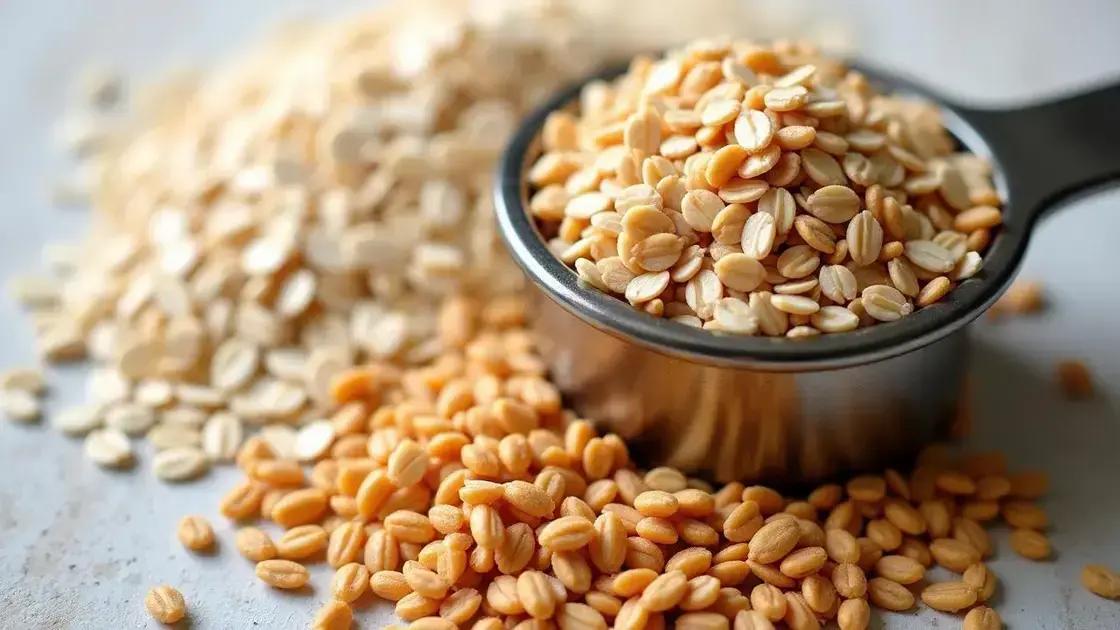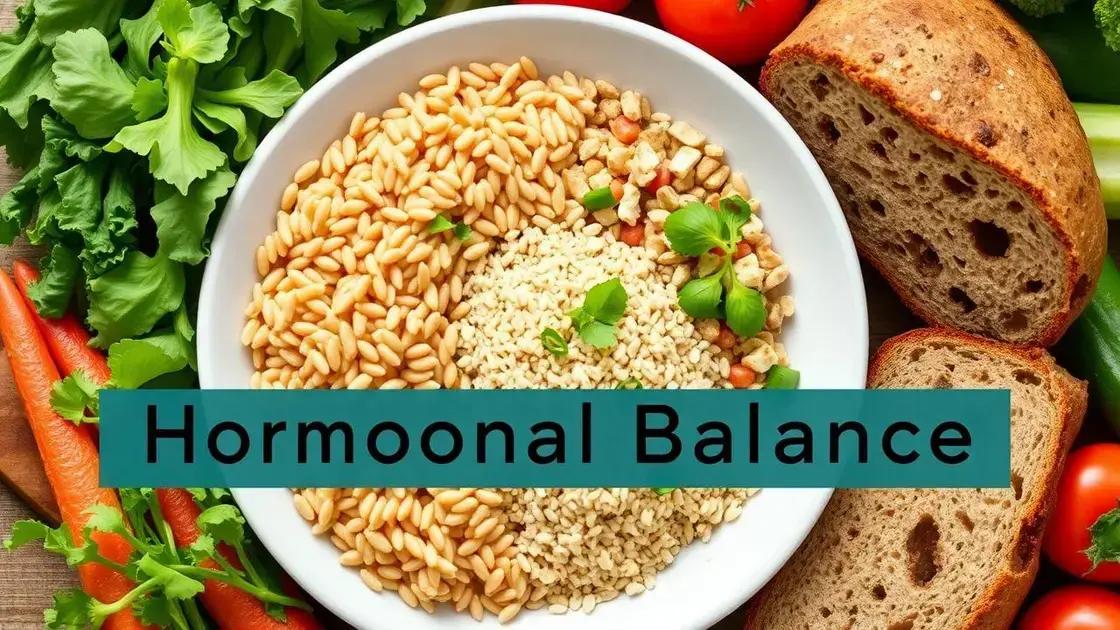Recipes with Whole Grain Bread boost energy levels and support hormonal balance by providing essential nutrients, fiber, and complex carbohydrates that stabilize blood sugar and hormones, making them a healthy choice for daily meals.
Are you tired of energy slumps and hormonal imbalances? Discover how recipes with whole grain bread can transform your health. Whole grain bread is not just delicious; it can be a powerhouse of nutrients that sustain your energy levels and support hormonal balance. In this article, we will explore the benefits of whole grain bread, share some tasty and nutritious recipes, and explain how incorporating these recipes into your diet can lead to a healthier you.
Understanding Whole Grain Bread

Understanding Whole Grain Bread is essential for anyone interested in making healthier dietary choices. Whole grain bread is made from flour that contains all parts of the grain—the bran, germ, and endosperm. This means it retains more nutrients compared to white bread. Eating whole grain bread may help provide sustained energy throughout the day.
Whole grains are a vital part of a balanced diet. They are rich in fiber, which promotes digestive health and helps keep you feeling full longer. Additionally, they contain important vitamins and minerals like B vitamins, magnesium, and iron.
Why Choose Whole Grain?
When choosing bread, look for labels that say “100% whole grain” or “whole wheat” to ensure you are getting the best nutritional benefits. Regular consumption of whole grain bread has been linked to numerous health benefits, including lower cholesterol levels, reduced risk of heart disease, and improved weight management.
Common Types of Whole Grain Bread
There are several varieties of whole grain bread available. Some popular types include:
- Whole Wheat Bread: Made from whole wheat flour and rich in nutrients.
- Oat Bread: Often contains oats, which are high in fiber and can help lower cholesterol.
- Rye Bread: Known for its dense texture, rye bread is also high in fiber and essential nutrients.
- Sourdough Bread: Made from fermented dough, it may be easier to digest and is often lower in gluten.
Most importantly, incorporating a variety of whole grain breads into your diet can help diversify your nutrient intake while keeping meals satisfying and delicious.
Benefits of Whole Grains for Energy

Benefits of Whole Grains for Energy are vast and essential for a healthy diet. Whole grains are packed with complex carbohydrates, which are the body’s primary source of energy. Unlike simple carbohydrates found in sugary snacks, complex carbs break down slowly, providing a steady release of energy.
When you consume whole grains, your body transforms the carbs into glucose. This glucose fuels your brain and muscles, helping you stay alert and active throughout the day. Foods like whole grain bread, oats, and brown rice can help you avoid energy crashes commonly associated with processed foods.
Fiber for Sustained Energy
Whole grains are rich in fiber, which supports your digestive system and keeps you feeling full longer. When you feel full, you are less likely to snack on unhealthy options that can spike your energy but lead to a crash. Fiber also helps maintain stable blood sugar levels, providing a consistent source of energy.
Vitamins and Minerals
In addition to carbs and fiber, whole grains are loaded with essential vitamins and minerals like B vitamins, magnesium, and iron. These nutrients play crucial roles in energy production. For instance, B vitamins help your body convert food into energy and support your nervous system.
Longer-Lasting Energy
Choosing whole grains over refined grains can significantly impact your energy levels. With whole grains, you’ll experience longer-lasting energy rather than quick spikes and crashes. This means improved focus and stamina, whether you are at work, exercising, or engaging in daily activities.
Delicious Recipes to Try

Here are some delicious recipes to try that incorporate whole grain bread. Each recipe is healthy, easy to prepare, and perfect for boosting energy levels.
1. Whole Grain Avocado Toast
Start your day with a nutritious breakfast by making whole grain avocado toast. Simply mash ripe avocados with a sprinkle of salt and pepper. Spread them over toasted whole grain bread. For added flavor, top with sliced tomatoes or a poached egg.
2. Whole Wheat Banana Bread
Banana bread is a classic treat. Use whole wheat flour to make it healthier! Combine ripe bananas, whole wheat flour, oats, cinnamon, honey, and eggs. Bake until golden brown for a delicious snack that provides sustained energy.
3. Mediterranean Whole Grain Sandwich
For a quick lunch, create a Mediterranean sandwich. Layer whole grain bread with hummus, fresh spinach, sliced cucumbers, tomatoes, and feta cheese. This meal is not only tasty but also packed with nutrients.
4. Whole Grain Bread Pudding
Transform leftover whole grain bread into a tasty dessert by making bread pudding. Mix cubed bread with eggs, milk, vanilla, and a bit of sugar. Bake until it’s set for a warm and comforting treat.
These recipes highlight the versatility of whole grain bread in your meals. Enjoy trying them and feel the energy boost throughout your day!
How Whole Grains Affect Hormones

How Whole Grains Affect Hormones is an important topic for anyone looking to maintain hormonal balance. Whole grains provide key nutrients that help regulate hormones in the body. One of the most significant ways they do this is through their high fiber content.
Fiber helps slow down digestion, which keeps blood sugar levels stable. Stable blood sugar levels are essential for balancing insulin, a hormone that plays a critical role in how your body uses energy. When you consume whole grains, you reduce the risk of insulin spikes and crashes, which can lead to further hormone imbalance.
The Role of Complex Carbohydrates
Whole grains are a source of complex carbohydrates, which are effective for hormone regulation. These carbs are slowly digested, providing steady energy. This steady energy is crucial for keeping stress hormones in check, such as cortisol. Elevated cortisol levels can lead to weight gain and other health issues.
Slow Release of Energy
Since whole grains digest slowly, they help maintain consistent energy levels. This slow release of energy aids in stabilizing other hormones that regulate mood and appetite, such as serotonin and leptin. Eating whole grains can promote feelings of fullness and satisfaction, reducing cravings for unhealthy snacks.
Vitamins and Minerals
Whole grains are rich in vitamins and minerals that support hormone health. Nutrients such as magnesium and zinc play crucial roles in hormone production and balance. For example, magnesium aids in regulating estrogen and testosterone levels, while zinc supports thyroid function.
Incorporating whole grains into your meals can positively impact your hormones, leading to better energy levels, mood stability, and overall health.
In Summary: Unlocking the Power of Whole Grains
Whole grains are not just a source of sustenance; they play a vital role in boosting energy levels and balancing hormones. By incorporating recipes using whole grain bread into your diet, you can enjoy delicious meals while reaping the health benefits they provide.
From the rich nutrients they offer to their capacity to stabilize blood sugar and hormone levels, whole grains are essential for a healthier lifestyle. By choosing whole grains over refined options, you set yourself on a path toward improved well-being and vitality.
Remember, small changes in your dietary choices can lead to significant health benefits, enhancing your energy and balancing your hormones.
FAQ – Frequently Asked Questions about Whole Grains
What are the health benefits of whole grains?
Whole grains provide essential nutrients, fiber, and vitamins that promote digestive health, regulate blood sugar, and support hormonal balance.
How do whole grains help with energy levels?
Whole grains contain complex carbohydrates that provide sustained energy by releasing glucose slowly into the bloodstream.
What recipes can I try using whole grain bread?
Delicious options include whole grain avocado toast, whole wheat banana bread, Mediterranean sandwiches, and bread pudding.
How do whole grains affect hormones?
Whole grains can help stabilize insulin levels, reduce cortisol, and support the balance of hormones such as estrogen and testosterone.
What types of whole grain bread should I look for?
Look for 100% whole grain or whole wheat varieties, which provide the most nutrients and health benefits.
Can I incorporate whole grains into every meal?
Yes! You can include whole grains in breakfast, lunch, and dinner through bread, grains, and baked goods.













